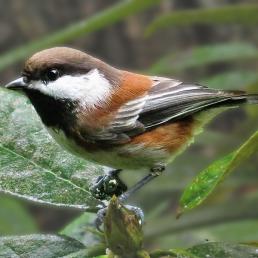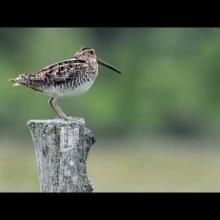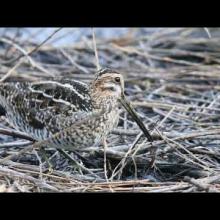

Join BirdNote tomorrow, November 30th!
Illustrator David Sibley and actor H. Jon Benjamin will face off in the bird illustration battle of the century during BirdNote's Year-end Celebration and Auction!
The Wilson's Snipe lives in marshes and muddy areas, where it probes for worms and other squirmy delights. But when spring comes, it takes to the air. The male Wilson's Snipe circles high above in a series of roller-coaster arcs, each descent marked by a loud and distinctive sound. This winnowing sound comes from its wings and a couple of tail feathers! Take a field trip with your local Audubon and you may find a snipe.
BirdNote ®
Two Wings and a Tail
Written by Dennis Paulson
This is BirdNote!
[The sounds of an active marsh]
In spring, around low, marshy spots in open country, listen for this sound coming from somewhere up in the sky.
[Winnowing of a Wilson’s Snipe]
It is the winnowing sound of the Wilson’s Snipe. Look up, and you may see the bird itself. The snipe, a brown, heavily striped sandpiper with a very long bill, lives in marshes and muddy areas, where it probes for worms and other squirmy delights. But when spring comes, it takes to the air.
[Winnowing of a Wilson’s Snipe]
The male snipe circles high above in a series of roller-coaster arcs, each descent marked by this loud and distinctive sound. His rapidly beating wings force air through his widespread outer tail-feathers, which are narrow and stiff. The resulting tremolo seems more than could come from a couple of tail-feathers. Each burst of sound has a Doppler effect, like the whistle of a passing train.
[Train whistle]
[Winnowing of a Wilson’s Snipe]
Snipes also sing from the ground, in this case a song like that of many other birds in spring.
[Vocal song of a Wilson’s Snipe]
But it is the winnowing that captures our attention: a twitterpated sandpiper making music with two wings and a tail.
[Winnowing of a Wilson’s Snipe]
For BirdNote, I'm Mary McCann.
###
Sounds of the Wilson’s Snipe provided by The Macaulay Library of Natural Sounds at the Cornell Lab of Ornithology, Ithaca, New York. Winnowing and calls recorded by Hershberger/Peyton/Little and winnowing alone recorded by G.A. Keller.
Quiet Planet QP09 1048 recorded by Gordon Hempton.
Train doppler effect recorded by JeffWojo on Freesound.org.
Producer: John Kessler
Executive Producer: Chris Peterson
© 2014 Tune In to Nature.org May 2018 /2021 Narrator: Mary McCann
ID#050106WISNKPLU WISN-02b






